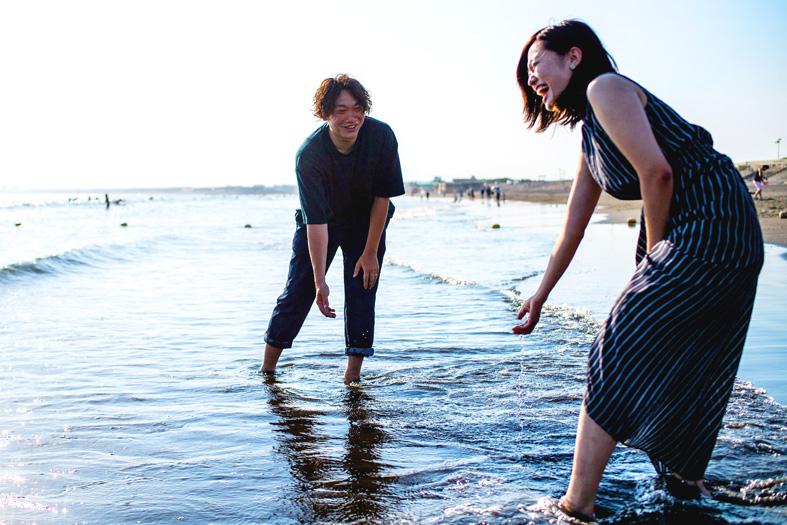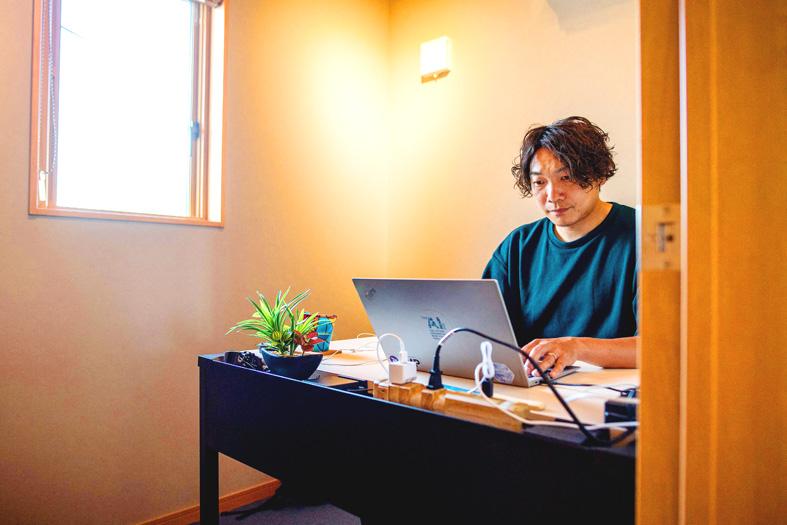Posted far from home for his job at Japanese conglomerate Hitachi Ltd, father of two Tsutomu Kojima was “really lonely” until he began working remotely during the COVID-19 pandemic for the first time.
COVID-19 has upended office routines worldwide, but in Japan — where punishing hours and reliance on paper files, ink stamps and fax machines has long been the norm — some say the shake-up was sorely needed.
Before the pandemic, just 9 percent of the Japanese workforce had ever teleworked, compared with 32 percent in the US and 22 percent in Germany, Tokyo-based consultancy firm Nomura Research Institute Ltd said.

Photo: AFP
However, a quiet revolution in the country’s rigid business culture is under way, with firms working to digitize operations and offer more flexibility to staff who were once expected to stay late, go drinking with their boss and accept far-flung transfers.
Kojima used to live alone in accommodation provided by Hitachi near Tokyo, an hour and a half by bullet train from his family in Nagoya.
Back then, he would return only twice a month, but now the 44-year-old works exclusively from home, saying he is more productive and closer to his teenage daughters.

Photo: AFP
“I have more time to help them with their studies. My youngest told me she hopes things stay like this,” he said.
“I used to feel really lonely” in Tokyo, Kojima said, adding that he has since realized that “true balance means not giving up on family.”
OLD HABITS
Nearly one-third of jobs in Japan were done remotely during the first COVID-19 wave in the spring of 2020, the Japan Productivity Center said, even though the government never imposed strict stay-at-home orders.
The rate has since fallen to 20 percent, but that is still far higher than before the pandemic, quarterly surveys by the non-profit organization showed.
To encourage telework, the government and some companies made efforts to phase out personalized ink stamps used to certify documents, as well as the ubiquitous fax machine.
Often in Japan, “business has to be done in person, on paper,” habits dating back to the 1970s and 1980s, when the Japanese economy was booming, said Hiroshi Ono, a professor at Hitotsubashi University specializing in human resources.
“One of the things COVID has done is bring those barriers down: Work doesn’t have to be done at the office, men can work at home,” he said.
Companies are realizing that new ways of working can be more efficient, he added.
“Before COVID, it was so important for employees to show that they’re working hard, instead of actually producing results.”
‘NEW BALANCE’
Reflecting trends elsewhere, people are also fleeing the big city.
A record number of company headquarters moved out of Tokyo last year, Teikoku Databank found.
Its population has also dropped for the first time in 26 years.
Among those who have upped sticks are Kazuki and Shizuka Kimura, who left their cramped Tokyo apartment for a custom-built house near the sea.
The couple now mostly do their jobs in communication and marketing remotely from Fujisawa, southwest of the capital, having struggled to work from home in Tokyo.
“It was really COVID that made us take this decision,” said Kazuki Kimura, who used to seek out other places to do meetings — at his parents’ home or in cafes, remote-work boxes set up in train stations and even karaoke booths.
“Sometimes you could hear singing from the booth next door,” which made it difficult to concentrate, said the 33-year-old, who is now learning to surf.
Shizuka Kimura, 29, said she thinks “more and more people are now prioritizing their well-being, rather than their job,” but questioned how quickly things will change on a wider scale.
This is a concern shared by Hiromi Murata, global research center manager and senior chief researcher at Recruit Works Institute, who said smaller companies might be slower to adapt to new work styles than big firms such as Hitachi, Panasonic Holdings Corp or telecoms giant Nippon Telegraph and Telephone Corp.
Remote work can also pose a problem for training new recruits, because “you learn on the job,” Murata said. “Before, it was so important to meet in the office ... each business must find a new balance, in their own way and time.”

Taiwan’s exports soared 56 percent year-on-year to an all-time high of US$64.05 billion last month, propelled by surging global demand for artificial intelligence (AI), high-performance computing and cloud service infrastructure, the Ministry of Finance said yesterday. Department of Statistics Director-General Beatrice Tsai (蔡美娜) called the figure an unexpected upside surprise, citing a wave of technology orders from overseas customers alongside the usual year-end shopping season for technology products. Growth is likely to remain strong this month, she said, projecting a 40 percent to 45 percent expansion on an annual basis. The outperformance could prompt the Directorate-General of Budget, Accounting and

The demise of the coal industry left the US’ Appalachian region in tatters, with lost jobs, spoiled water and countless kilometers of abandoned underground mines. Now entrepreneurs are eyeing the rural region with ambitious visions to rebuild its economy by converting old mines into solar power systems and data centers that could help fuel the increasing power demands of the artificial intelligence (AI) boom. One such project is underway by a non-profit team calling itself Energy DELTA (Discovery, Education, Learning and Technology Accelerator) Lab, which is looking to develop energy sources on about 26,305 hectares of old coal land in

Netflix on Friday faced fierce criticism over its blockbuster deal to acquire Warner Bros Discovery. The streaming giant is already viewed as a pariah in some Hollywood circles, largely due to its reluctance to release content in theaters and its disruption of traditional industry practices. As Netflix emerged as the likely winning bidder for Warner Bros — the studio behind Casablanca, the Harry Potter movies and Friends — Hollywood’s elite launched an aggressive campaign against the acquisition. Titanic director James Cameron called the buyout a “disaster,” while a group of prominent producers are lobbying US Congress to oppose the deal,

Two Chinese chipmakers are attracting strong retail investor demand, buoyed by industry peer Moore Threads Technology Co’s (摩爾線程) stellar debut. The retail portion of MetaX Integrated Circuits (Shanghai) Co’s (上海沐曦) upcoming initial public offering (IPO) was 2,986 times oversubscribed on Friday, according to a filing. Meanwhile, Beijing Onmicro Electronics Co (北京昂瑞微), which makes radio frequency chips, was 2,899 times oversubscribed on Friday, its filing showed. The bids coincided with Moore Threads’ trading debut, which surged 425 percent on Friday after raising 8 billion yuan (US$1.13 billion) on bets that the company could emerge as a viable local competitor to Nvidia